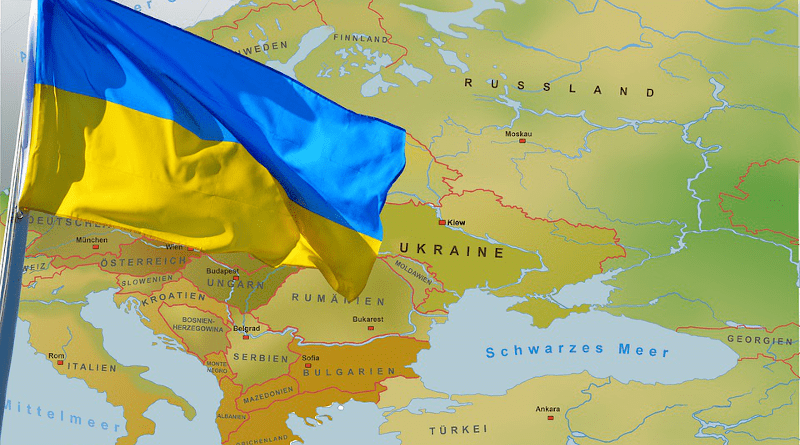Strategic Repercussions Of Russia-Ukraine Conflict – OpEd
The history of Russia-Ukraine strained relations dates back to the seizure of Ukraine by the Russian empire during the 17th century. Due to its geographic significance, Ukraine has always remained an attraction for many conquerors including Mongols, Polish and Lithuanian forces for several centuries. It formally became part of the Union of Soviet Socialist Republic (USSR) in 1922 after the communist revolution of 1917 until the disintegration of USSR in 1991.
Russia and Ukraine, two independent states are currently at war. Historically, the support of Russia existed more in the eastern side of the country as compared to the western coast primarily due to ethnic linkages. The eastern coast of Ukraine remained under Russian rule earlier than the western coast of the state. These ethnic and external linkages always posed challenge towards maintaining cohesion in Ukraine. Furthermore, the Russo-Ukraine crisis resurfaced after the annexation of Crimea by the Russian forces in 2014. The republic of Crimea wished to seek more support from the European Union. In order to follow suit, the Crimean nation protested to overthrow the leadership of pro-Russian president, Viktor Yanukovych.
The diplomatic relations between US and Ukraine were established in 1991 after the disintegration of USSR, which are always seen a security threat by Russia. Since then, Ukraine was considered as one of the important allies of the US in the Central Asian region. Simultaneously Ukraine also craved for the membership of the North Atlantic Treaty Organization (NATO). Its decision of joining NATO was however unacceptable to the Russian government particularly for two reasons i) article (v) of the NATO states that security against any member state by an adversary shall be considered against all NATO member states, and ii) to contain the control of United States (US) over Ukraine.
Ukraine became the third-largest nuclear weapon country with the disintegration of USSR. Budapest Memorandum of security assurance signed on December 5, 1994, by the US, United Kingdom (UK) and Russia vowed to be the key players in providing and ensuring security to Ukraine in the future both internally and externally, if required. As a newly emerged independent state, it also aspired to seek the international recognition and doing so, Ukraine was asked to become a non-nuclear-weapon state. Additionally, in order to pursue the membership of the Non-Proliferation Treaty (NPT), it was also mandatory for Ukraine to give up all its nuclear arsenal. Hence, abiding by the Memorandum, it joined NPT as a non-nuclear weapons state in 1994.
While agreeing to the Budapest Memorandum and giving up all its nuclear stockpile, Ukraine expected US intervention as a legal compulsion or a guarantee, when it comes to states survival and sovereignty. Ukraine pledged to surrender all its nuclear weapons stockpile in the exchange for economic assistance, political and security assurance.
The Russian invasion of Ukraine, in February this year, has breached the sovereignty of Ukraine. Unfortunately, Budapest Memorandum did not work ideally, as US avoided the direct involvement in current Russia-Ukraine conflict and started pledging indirect support to Ukraine. The U.S is assisting Ukraine in withdrawing the Russian forces from the country but situation is yet unclear. Moscow, despite strict obligations and restrictions imposed by the major powers and the international established regime, does not wish to repeal, but rather stands firm with its objectives.
While analyzing the situation of Ukraine, serious questions are being raised on Ukraine’s decision to surrender nuclear capability in lieu of security agreement and guarantees. It has been experienced in the past that retaining nuclear weapons have mostly ensured deterrence against external aggression, particularly in the Cuban Missile Crisis of 1962 that resulted in the notion of Detente which means the relaxation of tension; however, the efficacy of nuclear deterrence has also been noticed in the Kashmir dispute.
The invasion of Ukraine may have raised concerns between the have and have-nots. Thus, creating a very complex situation with regard to the national security of states from the external threat. The state, while keeping in view the significance of nuclear weapons, may think of developing it, particularly the weaker ones. The failure of the international established regime and the major powers for not protecting the sovereignty of other countries as promised in the previous agreements will not be a good precedence for future of non-proliferation efforts. Therefore, the states may consider the development of nuclear weapons as an authentic or guaranteed source of security for its sovereignty. The weaker states efforts to develop and excel in technological domain may pose a challenging environment on the globe. The world is already facing nuclear dangers in various domains that may be China-US tug of war, or India-Pakistan crisis stability or North Korea.
As great powers appear lacking in ensuring integrity and sovereignty of smaller states, the nuclear weapons will assume greater significance for the weaker nations. The objectives of nuclear non-proliferation, arms and disarmament may become a distant dream, if the economic, political, social or strategic aspirations of these states are not catered. The provision of the assured security mechanism by the international established regimes as well as the major powers could be the only way to avoid the nuclear proliferation in future.
Dr. Rahat Iqbal is currently working as an Associate Director Research at the Center for International Strategic Studies (CISS), Islamabad, Pakistan. She holds a Ph.D. Degree in International Relations from University of Peshawar, Pakistan. She can be reached at [email protected] or can be followed on twitter@rahatiqbal4

